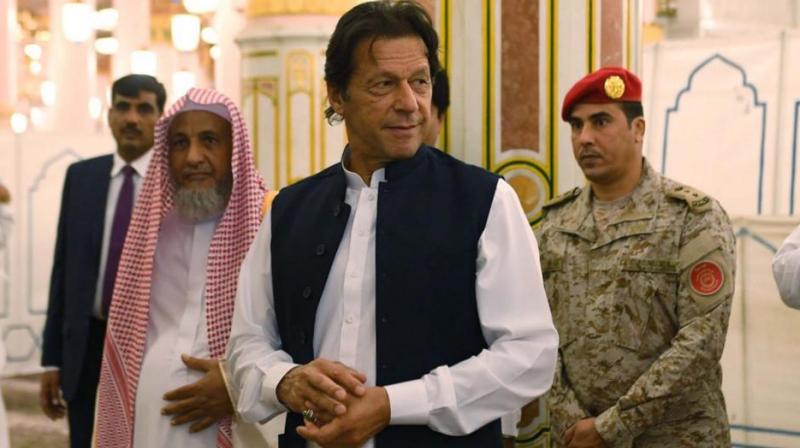Afghanisation' of Pak politics: The greatest head-scratcher
The Pakistani state doesn't want India in Afghanistan because it fears encirclement or whatever.

Call it the Afghanisation of politics. You can guess what they don’t want, but you can’t really be certain about what they do want. And maybe it makes a kind of sense: you can’t ever be defeated if you never say what it is that you really want.
Politics in Pakistan mirroring Pakistan on Afghanistan.
What does Pakistan want in Afghanistan? Given how obsessed Pakistan is with Afghanistan, you’d think there would be an easy, capsule answer to toss out and pop in.
Like: national security! India is the enemy! Politicians are corrupt!
But it’s not all that easy with Afghanistan. You can say with high confidence that the state doesn’t want India in Afghanistan and does want the Taliban to be part of the ruling dispensation. But that’s not really saying all that much.
The Pakistani state doesn’t want India in Afghanistan because it fears encirclement or whatever. Fine, at least it’s some kind of logic. But “no India in Afghanistan” translates into what exactly?
No physical presence? No military presence, but economic stuff acceptable? No presence meaning no influence? And no influence with whom: the Pakhtuns or the non-Pakhtuns? And if no influence anywhere, how do we negate India’s ties to the non-Pakhtuns in Afghanistan?
The “Taliban in government” stuff is difficult to flesh out, too. We seem sure that we don’t want to go back to the late ’90s, i.e. the Taliban outright ruling Afghanistan. But if we don’t want them to rule 100 per cent, then what per cent of power do we want for the Taliban?
Fifty per cent? 75? 25? 40? 10?
Nobody knows. And maybe not even ourselves.
If you don’t say what you want, you can never be defeated.
Contrast that with the Americans and the Afghan government. Wild conspiracy aside, it’s pretty easy to say that the Americans would rather have defeated the Taliban than not. Maybe the Americans would have wanted a residual military presence in Afghanistan, maybe they’d have stuck around to keep an eye on Pakistan and our nukes.
But you can pretty easily assert that the Americans, if they could have, would like to have militarily defeated the Taliban.
Same with the Afghan government. If it could, the Afghan government would rather not have to make peace with the Taliban. The last Afghan government or this one would rather that the US military or, less likely, the Afghan Army have defeated the Taliban, and the Afghan government get more power, more durability and become the long-term political solution in Afghanistan.
You can quite clearly see that no Afghan government will get what it really wants. But at least you can be sure what it really wants.
Not so with Pakistan. And now it has infected politics here. The Afghanisation of politics is really the mysteriousness of what’s going on here. As the government stumbles from crisis to crisis, as ministers begin to knife each other and confusion and chaos reign, it’s increasingly hard to figure out what this was and is all about.
What do they want?
We know that they don’t want Nawaz in. Fine. They hate it when one of their own turns on them — and few have belonged to and turned on as spectacularly as Nawaz has. But after Nawaz, what?
Imran may have been the obvious alternative, but it’s become blindingly obvious that there was zero preparation. And you can’t really blame Imran for that: why should he prepare in the final months for something he had not really prepared for in 22 years? But at least they could have done some prep. And enforced some discipline.
Aha, but the point is to keep all of them weak: Imran, Nawaz, Asif, whoever. Imran was just the latest beneficiary of the system’s periodic need for a new, or old but compliant, face. Again, plausible.
But there’s weak and then there’s catastrophic. If nothing else, you need the civilian front to stop from collapsing in on itself. Because immediate collapse requires constant hand-holding and in that case no one gets anything done.
Plus there’s the stuff with the other folk. What on earth is the Shahbaz thing all about? One possibility is that as Imran stumbles and the PTI lists, it’s become necessary to keep the pressure on the other side. Because you can’t afford for your precious experiment to be knocked over so soon.
But Shahbaz? It’s like going out of your way to make an example and enemy of the one chap who was desperate to be your friend. And while he maybe can’t do much for you as your friend, he could do something to you as your enemy.
What do they want?
The Asif stuff is equally puzzling. The GDA was primed, ready and willing to eat into the PPP’s seat count in rural Sindh. If you were going to keep up the pressure on Zardari, as seems obvious before and since the election, then why allow him to sweep to total victory in Sindh?
Of all the levers that you could want and you would want to deny your target, surely a total sweep of his base is a good idea to prevent. If they could do it to Nawaz in Punjab, why not Zardari in Sindh? What do they want?
For now, we can only guess what they don’t want. The Afghanisation of politics has arrived. And it may be the greatest head-scratcher yet.
By arrangement with Dawn

